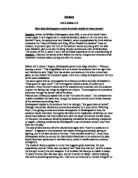How does Shakespeare create dramatic tension in act 2 scene 2 of Macbeth?
Act 2 Scene 2 of Macbeth is a decisive scene in the play as it creates dramatic tension, conflict and controversy. There are many themes in this play: tragedy, the supernatural, love, dishonesty, betrayal and greed. Macbeth murdered Duncan to prove his masculinity for his wife and also his hunger for more power. Lady Macbeth wanted Duncan dead because of her greed and the witches’ prophecies influence her. At the beginning of the play Macbeth is brave, content and loyal in contrast to his dark and sinister persona he adapts later on in the play. Whilst the main theme of Macbeth is one of tragic loss (in terms of the death of the King and indeed the loss of Macbeth’s mental state), greed also proves to be an influential factor in the downfall of both Macbeth and his wife. It, ultimately, changed their actions and cost them their lives.
At the beginning of the scene, Lady Macbeth is feeling confident. She says “ What hath quench'd them hath given me fire”, this indicating that she is feeling so powerful and inspired that nothing can stand in her way. Despite feeling confident, she feels agitated and remarks “Hark! Peace!” which demonstrates that she is concerned someone has been alerted to the couple’s plans and will discover their wretched methods; this sudden feeling of concern contrasts with her prior confident attitude and thus adds an element of drama to the situation.
After Macbeth has murdered Duncan he feels nervous we see this when he asks “Didst thou not hear a noise?” which indicates panic in his mind. Lady Macbeth clearly shares the same emotional state as she replies “I heard the owl scream…Did you not speak”. Shakespeare uses symbolism and metaphors in this quote alone to create a vivid image of a hellish scene - the owl representing the death – perhaps of Macbeth himself in the long-term, or possibly it is in reference to Duncan when he died, although we could safely discount that element as Duncan didn’t scream, instead the owl ‘screaming’ for him, itself showing the significance of all decency and honour has been lost. The owl could also be a metaphor for the bellman (which Lady Macbeth mentions) – in an historical respect, a bellman said “goodnight” or “goodbye” to prisoners who were about to be executed, thus creating a newer sense of evil and further emphasising the suspense. Shakespeare uses dramatic irony as the use of the owl suggests that there will be death later on. Even after the murder, Macbeth seems apprehensive as suggested in the following quote:

This is a preview of the whole essay
Peer Reviews
Here's what a star student thought of this essay
Quality of writing
Excluding one or two very tiny errors, the writing is perfectly accurate and eloquently written in a style that is not repetitive or confusing and is direct. In some cases, a couple more uses of terminology could be a benefit but as this is included in a few circumstances it would probably not make a huge difference.
Level of analysis
The analysis is clear and easy to follow, and points are developed and thoroughly explained without the candidate rambling or meandering too far away from what the question is asking. A good techinique is that the candidate has put each point and quote into context within the Act, so she can use how the characters may be feeling at that particular point as evidence as well (for instance, 'Lady Macbeth is irritated and ridicules him... he is powerful now that Duncan is dead'). Although individual points appear to be evaluted as the essay progresses, the overall conclusion could be improved, just to make general points about Shakespeare's techniques or how successful the candidate finds it.
Response to question
All areas seem to have been covered with a substantial amount of analysis in this essay as the candidate works through the Act. The idea of creating dramatic tension is both simple and complicated to write about in essays like this due to the broad range to write about which offers choice but has less of a focus, and the student has successfully developed points which do answer the question but at the same time are backed up with a response to do with the more specific themes of the play as well.







